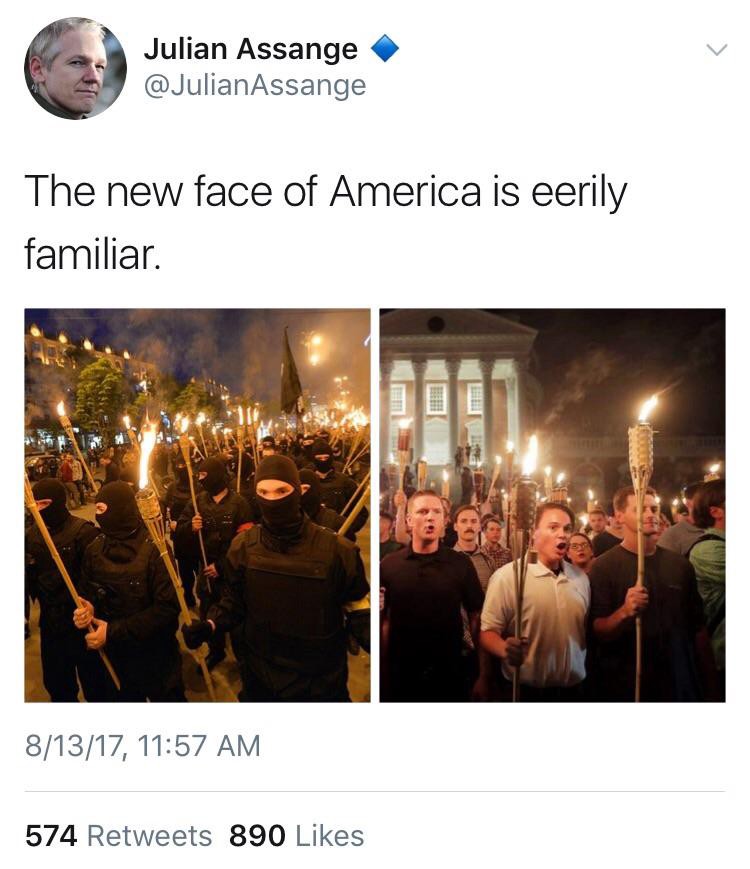 EXPOSING CAPITALISM'S MULTITUDE OF VICES AND INCURABLE PROBLEMS
EXPOSING CAPITALISM'S MULTITUDE OF VICES AND INCURABLE PROBLEMS
By Max Parry
First run on Mar 23, 2018 • Reposted Jun 26, 2022 & again on Sep 2, 2022
The United States is now arming Ukraine in its fight against ‘pro-Russian’ separatists in the eastern Donbass region. The flow of arms will inevitably escalate an already bloody civil war and worsen the strained relations between the United States and Russia. Despite the Obama administration’s decision not to arm Ukraine, Democrats have aligned themselves with establishment Republicans and neo-conservatives to urge Trump to do so amidst the ‘Russiagate’ hysteria following the 2016 election. On the one hand, these liberal politicians have claimed to take fright of the far right in the U.S. that was instrumental to the election of Donald Trump. They also claim the same in regards to the Ukip and Brexit, Marine Le Pen and the National Front in France, and the overall trend of growth in far right politics worldwide. Yet, the same Democrats have downplayed the role of far right nationalism in the Ukraine that played a large role in the Maidan protests and subsequent coup of the democratically-elected government of Viktor Yanukovych in 2014. The right-wing extremism in Ukraine is acceptable to downplay because they share a common enemy in Russia. Any attempt to reveal the nature of the current regime in Ukraine is mechanically dismissed as “Russian propaganda”, concealing the very real fascist elements that have been weaponized by the west to achieve its foreign policy interests in the new Cold War against Russia.
The crisis between western and eastern Ukraine and that between Russia and the United States and Europe is not new. It has endured for the past century and its current manifestation originated following the restoration of capitalism in Eastern Europe. Known as the ‘breadbasket of Europe’, the Ukraine with its 46 million people produced industrial goods and a quarter of the entire food in the Soviet Union prior to its independence. Heavy in industry and rich in resources, as an independent country it maintained market integration with Russia but its economy has been in shambles with its politics notoriously rotten. Ukraine’s stratified wealth gap is right beside Russia as the worst in the world due to the neoliberal looting of its former state industry which gave birth to its current ruling elite. In western media, the term “oligarchs” is being ubiquitously used to describe the political class dominant in Eastern Europe, which is the absolute height of hypocrisy since this class accumulated its wealth from the rapid privatization of state assets facilitated by the west. Widespread bankruptcy, closure of factories and rise in unemployment occurred in the Ukraine after the neoliberal robbery of its state property just like in Russia, as Naomi Klein illustrated in her unequaled work The Shock Doctrine. Since the fall of the Berlin Wall, the priority for the west has been to pull Ukraine into the EU sphere of influence and away from Russia while expanding NATO to its borders. All of the former Warsaw Pact nations have been enrolled into NATO, in addition to the Baltic states and the former Yugoslavia, a total of 13 countries since 1991. This expansion happened despite Russia’s disapproval, as it was promised to Gorbachev that NATO would not expand ‘one inch’ past East Germany. The last two decades of this broken promise have led the west and EU to directly interfere in the affairs of the Ukraine, culminating in the 2014 coup.
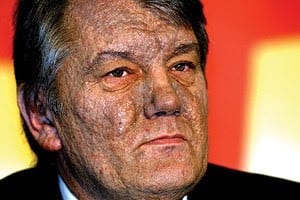
Viktor Yushchenko showing badly scarred face. In its savagery and cynicism, the trademark of a Western false flag.
The first foray of western ‘meddling’ was after the run-off of Ukraine’s 2004 presidential election was initially won by the Moscow-backed candidate, Viktor Yanukovych. Known as the Orange Revolution, it was one of many so-called ‘color revolutions’ in Eastern Europe featuring stage-managed mass demonstrations leading to western approved regime changes that were coordinated by PR firms and NGOs promoting western foreign policy interests. They organized the protests in response to claims of election rigging on the part of Yanukovych but it was only after a mysterious and still unsolved dioxin poisoning of his opponent, Viktor Yushchenko, that the voting scales tipped. Public sympathy for Yuschenko’s poison scarred face was manipulated enough to give him the victory during the second round. The characteristics and outcome of the Orange Revolution was similar to the Rose Revolution that had occurred in Georgia just a year earlier where the Moscow-backed President was ousted by the western puppet Mikhail Saakashvili, who would later play a direct role in Ukraine when he was appointed as Governor of Odessa after fleeing his own country for war crimes. Viktor Yanukovych’s Party of Regions is supported by the ethnically Russian population in the east while his opponent Yushchenko, head of Ukraine’s central bank, was supported by the western Ukrainian population and ran on a platform of enrolling the country into NATO membership. Western Ukraine has traditionally favored integration with Europe over Russia for historical reasons that are essential to understanding the entire conflict.
Historically, there has truly never been one Ukraine and this is no different today. The territory of Ukraine has for its entire existence served as a bridge between the east and west, having been conquered and divided by various occupying powers and empires going back several centuries. It finally became united only following extraordinary circumstances when Nazi Germany invaded Poland in 1939, resulting in a territory split between the Nazis and the Soviets. The mostly ethnic-Ukrainian eastern side of Poland suddenly became western Ukraine overnight after the signing of the Molotov-Ribbentrop non-aggression pact. Much of the population of western Ukraine were quislings that actually welcomed the invading Nazi army as liberators against the Soviets. When the Germans broke the pact and Operation Barbarossa began in 1941, more than 60,000 ethnic Ukrainians from the Galicia region volunteered to serve in the 14th Waffen Grenadier Division of the SS (1st Galician) to fight against the Red Army.

The most significant figure from this period of Ukraine’s history to understand its enduring implications today is the Ukrainian nationalist Stepan Bandera. Bandera was a leader of the 1930s Ukrainian independence movement who was jailed for his political activism as the leader of the Organization of Ukrainian Nationalists (OUN). Founded in 1929, the OUN’s stated creed was not just to establish an independent country but an ethnically pure Ukraine. It’s red and black flag symbolized land and blood (“blood and soil”) and its character was indisputably fascist. Bandera managed to escape from imprisonment when the Nazis invaded Poland in 1939 and he took refuge in German-occupied territory in western Ukraine after the Molotov-Ribbentrop pact was signed. When the Nazis broke the pact and invaded the Soviet Union in 1941, Bandera aligned with the Germans and openly collaborated with them. OUN members joined German units and carried out massive anti-Jewish pogroms. During this time, 33,000 Jews in just two days were executed by the Germans and their local Ukrainian collaborators in Kiev. Those massacred were buried in mass graves at Babi Yar, today the site of a famous holocaust memorial.
Bandera ran into trouble with the Germans when he was jailed by the Gestapo after the OUN attempted to declare an independent Ukrainian state in Lviv in late 1941 without German consent. However, two years later the collaboration resumed when the Germans released Bandera on the condition he would incite the local Ukrainian population in the war effort against the Soviets who were making advances. In 1943–1944, the Ukrainian Insurgent Army (UPA), the OUN’s military unit, carried out large scale ethnic cleansing of Poles and an estimated 60–100,000 civilians were slaughtered in Volhynia and Eastern Galicia. The 2016 Polish film Wolyn (Volhynia)(“Hatred”) is an incredible dramatization of this historical period where Banderites committed widespread terror against their own Polish and Jewish neighbors and assisted the occupying Germans in the holocaust. The plot centers around a young Polish girl who is forced into an arranged marriage by her family despite being in love with a Ukrainian boy, highlighting the inter-ethnic tensions which exploded during the war. The rest of the plot plays out as the war begins and later under the German occupation the horrific pogroms against Jews and Poles are assisted by the OUN. As a result of the film’s brutal depiction of the realities of Bandera’s followers, it was subsequently banned in the Ukraine where holocaust denial is currently nurtured and the OUN’s history has undergone historical revisionism.

The complicated relationship history between the OUN and the Germans has been the basis for historical revisionists in an attempt to rehabilitate their legacy, despite the overwhelming evidence of the OUN’s participation in the war crimes of the holocaust. Although it is true that towards the end of the war Banderites were fighting against both the Germans and the Soviets, this period is used by Ukrainian nationalists to whitewash the OUN’s legacy. Today Ukrainian nationalists are rewriting history portraying the movement as only tactically aligning with the Nazis and later resisting both foreign occupations. This not only excuses their extensive periods of collaboration with the Nazis and the genocide they participated in, but it has also been made using the same false equivalency comparing the crimes of Nazi Germany with the Soviet Union under Stalin being used by the far right worldwide today, including in the US. Many of the alleged crimes committed under Stalin that are still heavily in dispute, especially regarding Ukraine such as the Holodomor, may have originated from and been committed by the Nazis themselves if they indeed happened at all. This historical revisionism is also what is used by the United States and Ukraine as the ‘justification’ for being the only two nations who consistently each year vote against a United Nations anti-Nazi resolution proposed by Russia that “combats glorification of Nazism, Neo-Nazism and other practices that contribute to fuelling contemporary forms of racism, racial discrimination, xenophobia and related intolerance.” The United States defends its vote not just on the excuse of it violating “free speech” but also that is it is an issue ‘politicized’ by Russia against Ukraine, knowing full well the country would be penalized.
[dropcap]F[/dropcap]ollowing the Red Army’s victory, Nazi collaborators such as the Crimean Tatars were expelled from the Soviet Union in mass deportations as punishment. Tatars, Kalmyks, Chechens and other collaborators sent to Kazakhstan, Uzbekistan and Central Asia were also not exactly welcome to remain after the end of the war. The deportations in many respects may have saved them from punishment from the war crimes many of them had participated in. A significant percentage of Tatars for instance had welcomed the invading German occupiers in Crimea and others defected from the Red Army to join pro-Nazi volunteer units which slaughtered tens of thousands of ethnic Russians. Meanwhile, collaborators who escaped deportation in the OUN and the UPA went underground and carried on with a guerilla campaign against the Soviets throughout the 1950s. During the Cold War, the CIA in clandestine operations aided the OUN to undermine the Soviet Union and helped Bandera hide out until the KGB was finally able to assassinate him in Munich with a cyanide gas gun in 1959 on orders from Nikita Khruschev. However, it was also Khruschev who reversed many of Stalin’s policies and after 13 years of exile permitted many of the expelled collaborators to return. Without the consent of the Crimean people, the Ukrainian-born Khrushchev also gifted Crimea as a territory to Ukraine in 1954 despite the peninsula having been a Russian territory for 200 years.
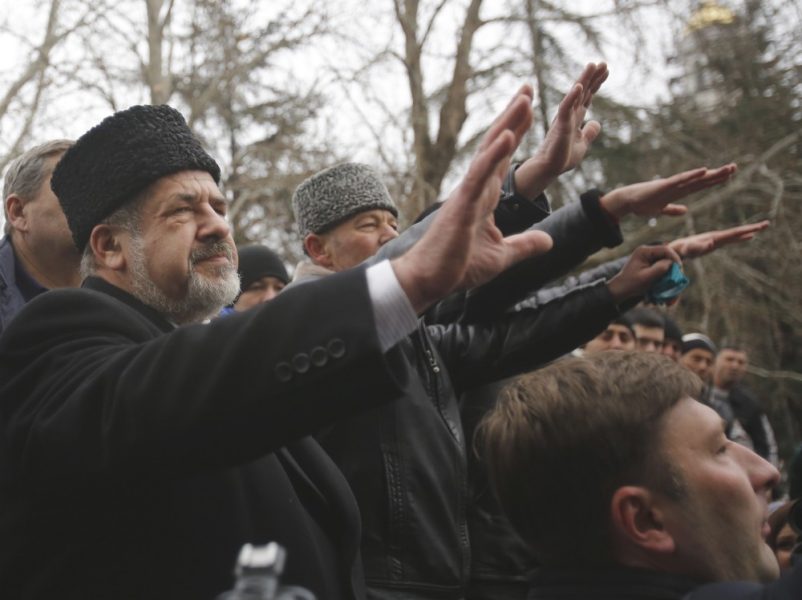
Right-wing Crimean Tatars protesting the 71st anniversary of their deportation by the USSR. Most of these right-wingers have convenient short memories or complete amnesia for their own crimes.
It was only following the collapse of the USSR that the legacy of the OUN first began to resurface, as participation of far-right nationalist parties openly in politics were strictly forbidden during the Soviet Union. In 1991, the same year as the Ukrainian declaration of independence from the USSR, the far-right nationalist Social-National Party of Ukraine was founded by Oleh Tyahnybok, with a stated inheritance of the OUN’s political tradition. The SNPU resurrected and appropriated fascist symbols such as the Wolfsangel emblem of the 2nd SS Panzer Division “Das Reich.” It was the restoration of capitalism which planted the seeds for the resurrection of Ukrainian neo-Nazism in the decades that followed. Following the 2004 Orange revolution, Viktor Yuschenko’s term as President proved to be an extremely unpopular disaster, especially for the eastern Ukrainian population that ethnically and linguistically identifies as Russian. The political corruption and economic stratification of the country also deepened but Yuschenko did manage one accomplishment and that was to nurture the nationalism and legacy of the OUN. Statues of Stepan Bandera were erected in Lviv and Yuschenko opposed measures adopted by Viktor Yanukovych’s Party of Regions to make Russian the second official language of Ukraine in an act of discrimination against the eastern part of the country.
Viktor Yanukovych won the 2010 Ukrainian Presidential election which was this time by all accounts a fair and legitimate vote. The same week, in one final move as President Viktor Yuschenko cemented the oligarchic alliance with Ukraine’s far-right nationalists by issuing a decree of the highest state honor of the “Hero of Ukraine” upon Stepan Bandera to the horror of the eastern Ukrainian and Jewish population. Once in office, Yanukovych was quick to revoke the Hero decree of Bandera, but his election in 2010 did not sway the west in its continued efforts to pull Ukraine into the EU’s orbit. Since 1991, Ukraine had maintained strong economic integration with Russia, but by the next decade Ukraine was being lured into incorporation with the EU’s free trade zone. In late 2013, Yanukovych was set to sign the Ukraine-European Union Association Agreement before backing out at the last minute after assessing its attached economic package of austerity measures at the demand of the IMF. For Ukraine to join the EU, it required billions in losses in trade with Russia, including the raising of utility rates such as electricity and natural gas, and the gutting of its industry especially in the eastern part of the country. Russia is the primary exporter of natural gas to Europe and the requirements of the agreement it could only interpret as an act of aggression on the part of EU. When Yanukovych put the negotiations to join the EU on hold, protests suddenly broke out in Kiev’s Maidan (“Independence Square”).
The protests were principally organized jointly by Ukraine’s oligarchic parties (Fatherland, UDAR) in cooperation with the far-right nationalist party Svoboda, formerly the SNPU formed in 1991 mentioned earlier. Its leader, Oleh Tyahnybok is also widely recognized as one of the most anti-Semitic politicians in Europe and, like the OUN, Svoboda’s brand of Ukrainian nationalism is fiercely anti-Russian. Tyahnybok frequently got into trouble for making public statements against the “Jewish-Muscovite mafia” he believes undermine Ukraine. From the very inception, far-right nationalists like Svoboda played an organizational role in the “pro-democracy” protests, it was not just a few bad apples as the west has claimed. Like the Orange Revolution, the Euromaidan protests were also promoted with the assistance of international NGOs such as George Soros’s Open Society Foundation. Non-governmental organizations is an oxymoron that disguises their real objective which is to often advance foreign policy interests and the global elite that sponsor them. Over a period of a few months, the protests became gradually infiltrated by even more radical elements such as the Right Sector paramilitary confederation. Right Sector’s flag is a combination of the OUN’s runic trident emblem and red and black (land and blood) colors.The French documentary Ukraine: Masks of the Revolution is an excellent investigation of the neo-Nazi elements that played such a significant role in Maidan.
Foreign meddling was also present from its outset. U.S. Senator John McCain and the Assistant Secretary of State for European and Eurasian Affairs, Victoria Nuland, traveled to Ukraine and appeared at the protests. Nuland even handed out biscuits to the crowd in a symbolic gesture and McCain spoke on stage with Tyahnybok pledging solidarity with the demonstrators. The response to Yanukovych’s refusal to sign the EU-Association Agreement was not just agitation in the streets led by local fascists and imported mercenaries, but its organizational direction was coming from foreign dignitaries like Nuland. Imagine if Putin had sent representatives to Black Lives Matter, Standing Rock or Occupy Wall Street protests? Nuland, McCain and Vice President Joe Biden all directly met with Tyahnybok. It was an infamous leaked phone call of Nuland in conversation with the U.S. Ambassador to Ukraine openly stating their preference and plans to install right-wing banker Arseniy Yatsenyuk of Fatherland as Ukraine’s President that exposed their plans to stage a coup ousting Yanukovych. The media overshadowed this by focusing on Nuland’s vulgarity during the phone call, rather than the substance of the conversation which was two prominent U.S. officials casually discussing their plans to remove a democratically elected leader of a foreign country. As the protests became increasingly violent the deliberate provocations of riot police eventually led to deadly clashes. It culminated in the gunning down of protesters by mysterious snipers, later revealed in confessions to be hired Georgian assassins in a ‘false flag’ operation that was pinned on the police and Yanukovych. This successfully gave the impression to the outside world that Ukraine’s government was a ‘dictatorship’ cracking down on the protesters, many of whom were paid provocateurs, football hooligans and trained mercenaries.
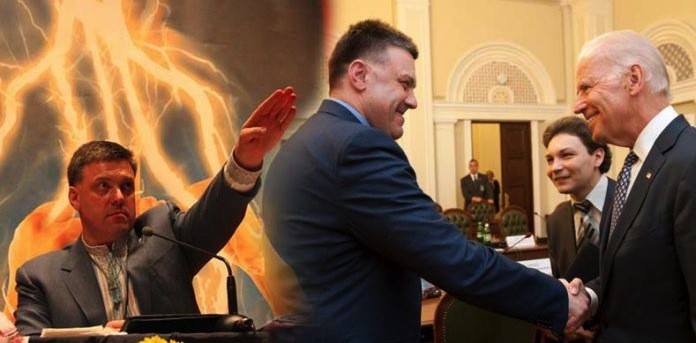
War hawk, avowed Zionist (like the rest of the Duopoly politicians) and globalist Joe Biden, who normally hides behind a sheep's clothing, warmly shakes hands with Oleh Tyahnybok of Svoboda. In all matters of this kind, the full complicity of a prostituted media is vital to maintain the central deceptions.
Yanukovych buckled under pressure and signed an agreement to establish a unity government consisting of Fatherland, Svoboda and UDAR ‘s fascist-oligarchic coalition. The agreement only emboldened the opposition which broke the agreement within a matter of days. The new Ukrainian government suddenly consisted of several ministers with far-right fascist allegiances, from Andriy Parubiy as commander of national defense and security council to Svoboda members being appointed as prosecutor generals and ministers of defense. The Ukrainian parliament shortly thereafter voted to remove Yanukovych, and after the putsch Yatsenyuk was hand picked to become the new President. Yanukovych had to flee from paramilitary groups firing on his limo and was only saved from assassination when Russia sent special forces in to rescue him where he remains in exile still wanted for high treason. Russia responded by not recognizing the new illegal government in Kiev, in turn demanding that all rights of Ukrainians be protected in defiance of the new constitution which was not properly federalist. The new government discriminated against rights to regions and minorities, especially that of the Russian minority in the east.
Crimeans in particular were incensed about these developments and demanded their right to self-determination, taking over buildings and surrounding military bases in anti-Maidan counter-demonstrations. Crimea proceeded to hold a referendum to return home, with 82% percent of the population participating and 96% voting to join Russia. The west characterized the referendum as rigged, despite the reality that 75% of Crimeans speak and identify as Russian. It further depicted it as an “annexation” by Russia and an invasion and violation of Ukraine’s sovereignty, in complete disregard of the fact that Russia already had a military base located in Sevastopol. The Black Sea in Crimea is also vital to Russia’s very economic survival with its shipping and oil and gas pipelines. In southern Ukraine, anti-Maidan demonstrators were attacked by a mob of Ukrainian nationalist football hooligan ‘Ultras’ and Right Sector members who together firebombed a House of Trade Unions. The estimated death toll was 48 people, but many witnesses claim this is a deceptive underestimate by pro-Maidan corrupt authorities and that during the entire night bodies were being removed and the actual number is much higher. This tragedy, known as the Odessa massacre, received little coverage from mainstream media especially in comparison to the victims of the sniper attacks in Kiev during Maidan.
In eastern Ukraine, the People’s Republics of Donetsk and Luhansk were proclaimed by militant separatists seeking to join Russia which were immediately denounced as terrorist organizations by the new Ukrainian government, leading to a full-scale civil war breaking out in the Donbass region. International tensions continued when Malaysia Airlines Flight 17 was shot down over Donetsk, killing all 298 passengers. The Obama administration and the Ukrainian government immediately blamed the separatists claiming they shot a surface to air missile, despite their lack of anti-aircraft capability to shoot down a Boeing 777 more than 30,000 ft in the air. However, the late award-winning journalist Robert Parry alleged a whistleblowing intelligence source told him the U.S. was concealing photographic evidence it was actually Ukrainian troops who shot down MH17. The Ukrainian army also began incorporating the neo-Nazi paramilitary groups that were used as shock troops in the Maidan protests into its National Guard regiments to fight the separatists, in particular the Special Operations Detachment “Azov”, widely known as the Azov Battalion, whose iconography is lifted from various runic symbols used by the OUN and the SS division “Das Reich.“



Much was made of Yanukovych’s wealth and corruption as an oligarch, yet the west has backed Petro Poroshenko, the current Ukrainian President who is nicknamed the “Chocolate King” for being obscenely enriched by his ownership of the chocolate company Roshen. Meanwhile the country’s economic crisis continues to worsen as the Euromaidan coup only brought further looting of its resources and industry by western big business. Burisma Holdings, one of Ukraine’s largest natural gas and fracking companies even appointed Hunter Biden, Joe Biden’s son, to its board of directors following the 2014 coup. Poroshenko’s regime has also collapsed into infighting like that of Yuschenko, as he recently expelled his previous ally the ex-Georgian President Saakashvili that was appointed the Governor of Odessa.
Along with the Trump administration, Justin Trudeau and Canada have also greenlighted weapons sales. Coincidentally enough, one of the higher ups in Justin Trudeau’s cabinet is none other than a direct descendant of Ukrainian Nazis. Canadian Minister of Foreign Affairs Chrystia Freeland’s grandfather, Michael Chomiak, was the editor-in-chief of a Ukrainian-language pro-Nazi newspaper called Krakivs’ki Visti in Nazi-occupied Krakow during World War II, which she continues to lie about and the media dismisses as Kremlin propaganda despite its confirmation by holocaust historians. After the revelations about Freeland’s family history became the subject of controversy in 2016, it also became a hot topic that there were monuments all over Canada in places such as Ontario commemorating figures who served with the 14th SS Galizien Division and in Edmonton honoring Roman Shukhevych, the leader of the Ukrainian Insurgent Army.
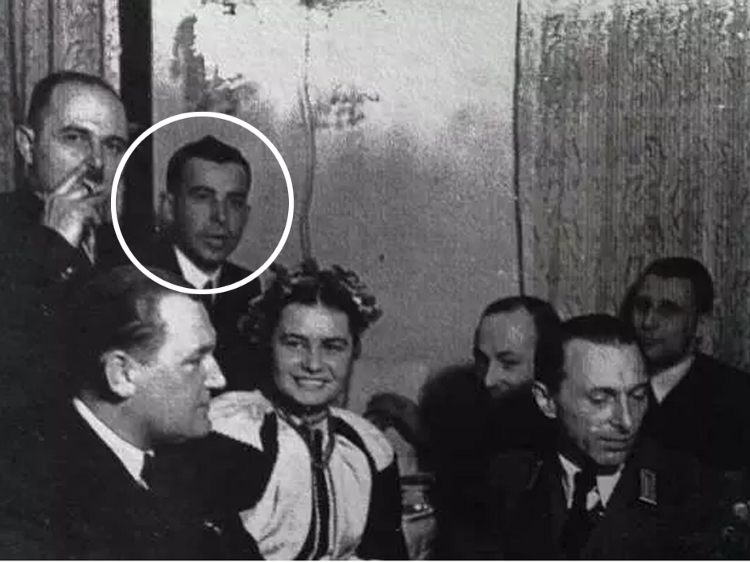
Michael Chomiak (circled), grandfather of Canadian Foreign Minister Chrystia Freeland at a party with Nazi propagandist Emil Gassner (bottom right).
Russia has found itself clearly in the crosshairs of imperialism, and many events such as the breakup of the former Yugoslavia and the color revolutions in Ukraine and Georgia have become increasingly clearer in hindsight. For the west, the cold war never really ended and the dismemberment and recolonization of Russia is its ultimate goal. By far the most excellent overview of the entire history of this conflict in the Oliver Stone produced documentary, Ukraine on Fire, directed by Igor Lopatonok which also makes a nice companion piece to Stone’s The Putin Interviews. Shortly after the Trump administration opted to arm Ukraine, it has been revealed the Azov battalion is already one of the regiments now receiving western arms, confirming the worst fears of many of those aware of the reality in Ukraine. Monuments to Nazi collaborators and Ukrainian nationalists who led anti-Jewish pogroms continue to be erected while torch marches of thousands of Ukrainian far rightists are held regularly in Kiev which are strikingly similar to the “Unite the Right” rally in Charlottesville, Virginia last August that liberal politicians claimed to be horrified by. A wave of such marches are occurring all over Eastern Europe, from Latvia to Bulgaria, honoring their own historical equivalents of the Banderites who welcomed the Axis invasions. The Azov battalion’s political party, National Corps, has also formed a unit called the National Militia consisting of 600 far-right vigilante volunteers to patrol the streets of Kiev. The reality in Ukraine is kept hidden because it doesn’t fit the narrative that the west has constructed about Putin, particularly complicating the allegations Russia is somehow behind the rise of the far right in the US. It was candidate Donald Trump who campaigned as a dove on the Ukraine issue but it is Democrats, united with dangerous neo-cons like John McCain, that have pushed him to arm the Poroshenko regime amidst the Mueller probe. It seems all it takes to be a ‘good’ neo-Nazi is to be the kind that is anti-Russia.
 Max Parry is an independent journalist and geopolitical analyst based in New York City. His writing has appeared widely in alternative media and he is a frequent political commentator featured in Sputnik News and Press TV. Max can be reached at maxrparry@live.com
Max Parry is an independent journalist and geopolitical analyst based in New York City. His writing has appeared widely in alternative media and he is a frequent political commentator featured in Sputnik News and Press TV. Max can be reached at maxrparry@live.com
![]() Don’t forget to sign up for our FREE bulletin. Get The Greanville Post in your mailbox every few days.
Don’t forget to sign up for our FREE bulletin. Get The Greanville Post in your mailbox every few days.
[newsletter_form]
[premium_newsticker id=”211406″]

This work is licensed under a Creative Commons Attribution-NonCommercial 4.0 International License



